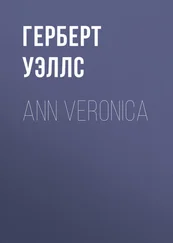ANN VERONICA
A MODERN LOVE STORY
BY H. G. WELLS
CONTENTS
CHAP.
I. ANN VERONICA TALKS TO HER FATHER
II. ANN VERONICA GATHERS POINTS OF VIEW
III. THE MORNING OF THE CRISIS
IV. THE CRISIS
V. THE FLIGHT TO LONDON
VI. EXPOSTULATIONS
VII. IDEALS AND A REALITY
VIII. BIOLOGY
IX. DISCORDS
X. THE SUFFRAGETTES
XI. THOUGHTS IN PRISON
XII. ANN VERONICA PUTS THINGS IN ORDER
XIII. THE SAPPHIRE RING
XIV. THE COLLAPSE OF THE PENITENT
XV. THE LAST DAYS AT HOME
XVI. IN THE MOUNTAINS
XVII. IN PERSPECTIVE
"The art of ignoring is one of the accomplishments of every
well-bred girl, so carefully instilled that at last she can even
ignore her own thoughts and her own knowledge."
ANN VERONICA
CHAPTER THE FIRST
ANN VERONICA TALKS TO HER FATHER
Part 1
One Wednesday afternoon in late September, Ann Veronica Stanley
came down from London in a state of solemn excitement and quite
resolved to have things out with her father that very evening.
She had trembled on the verge of such a resolution before, but
this time quite definitely she made it. A crisis had been
reached, and she was almost glad it had been reached. She made
up her mind in the train home that it should be a decisive
crisis. It is for that reason that this novel begins with her
there, and neither earlier nor later, for it is the history of
this crisis and its consequences that this novel has to tell.
She had a compartment to herself in the train from London to
Morningside Park, and she sat with both her feet on the seat in
an attitude that would certainly have distressed her mother to
see, and horrified her grandmother beyond measure; she sat with
her knees up to her chin and her hands clasped before them, and
she was so lost in thought that she discovered with a start, from
a lettered lamp, that she was at Morningside Park, and thought
she was moving out of the station, whereas she was only moving
in. "Lord!" she said. She jumped up at once, caught up a
leather clutch containing notebooks, a fat text-book, and a
chocolate-and-yellow-covered pamphlet, and leaped neatly from the
carriage, only to discover that the train was slowing down and
that she had to traverse the full length of the platform past it
again as the result of her precipitation. "Sold again," she
remarked. "Idiot!" She raged inwardly while she walked along
with that air of self-contained serenity that is proper to a
young lady of nearly two-and-twenty under the eye of the world.
She walked down the station approach, past the neat, obtrusive
offices of the coal merchant and the house agent, and so to the
wicket-gate by the butcher's shop that led to the field path to
her home. Outside the post-office stood a no-hatted, blond young
man in gray flannels, who was elaborately affixing a stamp to a
letter. At the sight of her he became rigid and a singularly
bright shade of pink. She made herself serenely unaware of his
existence, though it may be it was his presence that sent her by
the field detour instead of by the direct path up the Avenue.
"Umph!" he said, and regarded his letter doubtfully before
consigning it to the pillar-box. "Here goes," he said. Then he
hovered undecidedly for some seconds with his hands in his
pockets and his mouth puckered to a whistle before he turned to
go home by the Avenue.
Ann Veronica forgot him as soon as she was through the gate, and
her face resumed its expression of stern preoccupation. "It's
either now or never," she said to herself. . . .
Morningside Park was a suburb that had not altogether, as people
say, come off. It consisted, like pre-Roman Gaul, of three
parts. There was first the Avenue, which ran in a consciously
elegant curve from the railway station into an undeveloped
wilderness of agriculture, with big, yellow brick villas on
either side, and then there was the pavement, the little clump of
shops about the post-office, and under the railway arch was a
congestion of workmen's dwellings. The road from Surbiton and
Epsom ran under the arch, and, like a bright fungoid growth in
the ditch, there was now appearing a sort of fourth estate of
little red-and-white rough-cast villas, with meretricious gables
and very brassy window-blinds. Behind the Avenue was a little
hill, and an iron-fenced path went over the crest of this to a
stile under an elm-tree, and forked there, with one branch going
back into the Avenue again.
"It's either now or never," said Ann Veronica, again ascending
this stile. "Much as I hate rows, I've either got to make a
stand or give in altogether."
She seated herself in a loose and easy attitude and surveyed the
backs of the Avenue houses; then her eyes wandered to where the
new red-and-white villas peeped among the trees. She seemed to
be making some sort of inventory. "Ye Gods!" she said at last.
"WHAT a place!
"Stuffy isn't the word for it.
"I wonder what he takes me for?"
When presently she got down from the stile a certain note of
internal conflict, a touch of doubt, had gone from her
warm-tinted face. She had now the clear and tranquil expression
of one whose mind is made up. Her back had stiffened, and her
hazel eyes looked steadfastly ahead.
As she approached the corner of the Avenue the blond, no-hatted
man in gray flannels appeared. There was a certain air of forced
fortuity in his manner. He saluted awkwardly. "Hello, Vee!" he
said.
"Hello, Teddy!" she answered.
He hung vaguely for a moment as she passed.
But it was clear she was in no mood for Teddys. He realized that
he was committed to the path across the fields, an uninteresting
walk at the best of times.
"Oh, dammit!" he remarked, "dammit!" with great bitterness as he
faced it.
Part 2
Ann Veronica Stanley was twenty-one and a half years old. She
had black hair, fine eyebrows, and a clear complexion; and the
forces that had modelled her features had loved and lingered at
their work and made them subtle and fine. She was slender, and
sometimes she seemed tall, and walked and carried herself lightly
and joyfully as one who commonly and habitually feels well, and
sometimes she stooped a little and was preoccupied. Her lips
came together with an expression between contentment and the
faintest shadow of a smile, her manner was one of quiet reserve,
and behind this mask she was wildly discontented and eager for
freedom and life.
She wanted to live. She was vehemently impatient--she did not
clearly know for what--to do, to be, to experience. And
experience was slow in coming. All the world about her seemed to
be--how can one put it? --in wrappers, like a house when people
leave it in the summer. The blinds were all drawn, the sunlight
kept out, one could not tell what colors these gray swathings
hid. She wanted to know. And there was no intimation whatever
that the blinds would ever go up or the windows or doors be
opened, or the chandeliers, that seemed to promise such a blaze
of fire, unveiled and furnished and lit. Dim souls flitted about
her, not only speaking but it would seem even thinking in
undertones. . . .
During her school days, especially her earlier school days, the
world had been very explicit with her, telling her what to do,
what not to do, giving her lessons to learn and games to play and
Читать дальше












